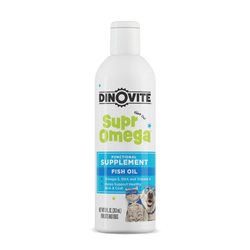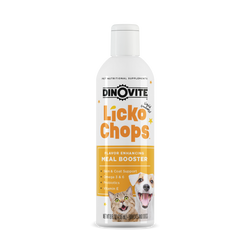Dog Gas

"Why Does my Dog Fart a Lot and It Smells?" Dog Gas Tips
What Does It Mean If Your Dog Is Gassy?
If your dog has bad gas suddenly, you’re probably wondering what’s causing it—and how to stop it. Occasional gas in dogs is normal, but frequent or extremely foul-smelling gas may indicate an underlying issue in their digestive tracts. Common causes of dog passing gas can include:
- Dietary issues – Low-quality dog food with fillers, grains, or artificial ingredients can be hard to digest.
- Food allergies or sensitivities – Some dogs struggle with lactose intolerance, wheat, soy, or proteins like chicken or beef.
- Eating too fast – Gulping food down can cause excess air intake, leading to bloating and gas.
- Lack of digestive enzymes – Enzymes help promote healthy digestion and may reduce gas production.
- Imbalanced gut bacteria – A lack of probiotics for dogs can damage good bacteria in your dog's gut, causing gas and bloating.
-
Table scraps or high-fat foods – Rich, fatty, or human foods can upset your dog’s stomach and increase gas.
If your dog has bad gas regularly, it may be time to evaluate their diet and digestion.

My Dog Has Bad Gas—What Can I Give Him?
If your dog is constantly passing gas, making changes to their diet and adding digestive support may make a difference. Here are a few ideas to help relieve gas and improve digestion:
1. Switch to a High-Quality, Low-Filler Diet
Many commercial dog foods contain grains, fillers, and artificial additives that can cause digestive upset. Switching to a high-protein, grain-free, and minimally processed diet can help reduce gas.
2. Add Digestive Enzymes
Digestive enzymes for dogs help break down food more effectively, reducing fermentation in the gut (which leads to gas). Look for a dog supplement that includes:
- Protease – Breaks down proteins
- Amylase – Aids in carbohydrate digestion
-
Lipase – Helps digest fats
Adding digestive enzymes to your dog’s diet can help them absorb nutrients better and minimize excessive gas.
3. Probiotics for Dogs
Probiotics balance gut bacteria, supporting digestion and reducing gas. A dog probiotic powder can help restore healthy bacteria, especially if your dog has been on antibiotics or has frequent stomach upset.
4. Feed Small, Frequent Meals
Large meals can overwhelm your dog’s digestive system, causing bloating and excess gas. Feeding smaller portions more frequently can help regulate digestion.
5. Try a Homemade Dog Food Recipe
If your dog has a sensitive stomach, switching to a homemade diet may help. Homemade dog food allows you to control ingredients and eliminate potential irritants.
Here’s an easy homemade dog food recipe to support digestion:
Homemade Dog Food Recipe
Ingredients:
- 5 lbs ground meat (70/30 for higher fat content)
- 9 eggs
- 2 cups cooked white rice
- 1 scoop dog probiotic powder
- 1 scoop digestive enzymes for dogs
- 1 tube Lickochops or SuprOmega for omega fatty acids
Cook the meat and eggs thoroughly, then mix with the other ingredients. Serve in small portions and refrigerate leftovers.
.png)
Digestive Enzymes vs. Probiotics: What’s the Difference?
Both digestive enzymes and probiotics for dogs support digestion, but they serve different purposes:
- Digestive enzymes break down food components (proteins, carbs, fats) for better absorption.
- Probiotics introduce beneficial bacteria to support gut health and prevent imbalances that lead to gas and bloating.
Using both can maximize digestive health and minimize gas issues.
When to Give Your Dog Digestive Enzymes?
Dogs benefit from digestive enzymes if they:
- Experience frequent gas or bloating
- Have trouble digesting their food
- Struggle with food sensitivity
- Eat a processed kibble diet (which lacks natural enzymes)
Is Pumpkin a Digestive Enzyme?
Pumpkin itself is not a digestive enzyme, but it is a great dog upset stomach remedy because it’s:
- High in fiber, which regulates digestion
- A natural prebiotic, feeding good gut bacteria
- Easy to digest, making it perfect for sensitive stomachs
A spoonful of pumpkin can help relieve mild digestive issues, but for persistent gas, digestive enzymes may be a better solution.
How Do I Add Enzymes to My Dog’s Diet?
To improve digestion and reduce gas, add digestive enzymes in one of these ways:
- Dog supplement powder – Mix into your dog’s food daily.
- Raw food diet – Fresh, raw meat naturally contains enzymes.
- Fermented foods – A small amount of fermented veggies (like sauerkraut) can provide natural enzymes.
By supporting your dog’s digestion with probiotics, digestive enzymes, and a healthy diet, you can help eliminate excessive gas and keep your pup feeling great.
NOTE: Dogs have a very acidic stomach (PH of 1) environment that kills the bacteria on fresh meat. This is how they can eat fresh meat and not get sick. It is also why dogs can knock over garbage cans, eat the contents and live to do it again the next week. After all, Dogs are natural scavengers.
Dogs fed fresh meat based diets, digest their food well, are less gassy and have smaller, more compact bowel movements 🐕
*All information on this website is for educational purposes only and is not intended to replace the expert advice of a veterinarian or veterinary practitioner.
Related Products


